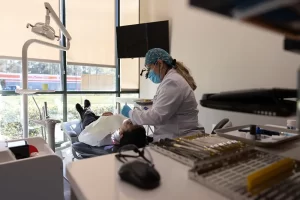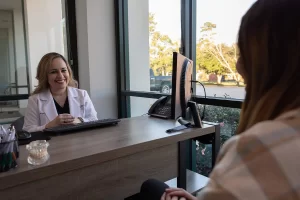Do You Know the Risks of Porcelain Veneer Treatment?

Our top-rated Slidell, LA, dentist walks you through the risks, so you can make an informed decision about your next cosmetic dental treatment. Contact our Slidell, LA, dentist today by calling (985) 214-2844 to schedule an appointment. We also proudly serve patients coming from Lacombe, Mandeville, Pearl River, and the surrounding areas.
Subtle Changes, Big Confidence From Dr. Pamela Daigle
You don’t need to completely change your smile to love it again—sometimes, small refinements can make all the difference. Our cosmetic dentist in Slidell, Dr. Pamela Daigle, offers expertly crafted porcelain veneers to help patients subtly and beautifully enhance their appearance. Whether you’re correcting spacing, reshaping a few teeth, or boosting brightness, Dr. Daigle brings both technical skill and a gentle touch to every treatment. She earned her first dental degree in Lima, Peru, then built on that foundation at LSU School of Dentistry, where she earned her second. Her multilingual abilities (English, Spanish, Portuguese) and compassionate approach create a safe, welcoming environment where patients feel empowered to pursue the smile they’ve always wanted. Between procedures, you’ll often find her chatting with patients about life, family, and the best local spots in Slidell to explore. Your smile should reflect the best version of you—and Dr. Daigle is here to help make that happen.
Understanding Dental Veneers in Slidell, LA
Dental veneers are thin, custom-made shells of tooth-colored materials designed to cover the front surface of teeth to improve their appearance. They are a popular cosmetic dentistry technique used to address various aesthetic concerns, such as discoloration, chips, gaps, or irregularities. The process of crafting dental veneers involves several key steps, including consultation and design, tooth preparation, impressions, and color matching. Dental veneers can be made from porcelain or composite resin materials, each with its own unique characteristics and benefits.
Porcelain Veneer Risks Near Pearl River, LA
Tooth Sensitivity
One of the most common side effects of porcelain veneers is tooth sensitivity. This can occur when the thin layer of enamel on the front of the tooth is removed to make room for the veneer. It can expose the dentin, which is the sensitive layer of the tooth that contains nerve endings. While tooth sensitivity is usually temporary and can be managed with over-the-counter pain relievers or desensitizing toothpaste, it can be uncomfortable, and persistent teeth sensitivity should be discussed with your dentist.
Damage to Natural Teeth
Another potential risk of porcelain veneers is damage to your natural teeth. When the veneer is applied, the dentist will need to remove a small amount of enamel from the front of your teeth. This can weaken the tooth and make it more susceptible to damage, such as cracking, chipping, or even broken teeth. In some cases, the veneer may also come loose and damage the natural tooth underneath.
Potential for Non-Ideal Fit
There’s a slight chance that the veneers may not fit perfectly. They might feel uncomfortable, alter your bite, or cause speech issues, which would require further dental work.
Gum Irritation
Porcelain veneers can also cause irritation or inflammation of the gum tissues, particularly if the veneer isn’t properly fitted or if there’s a buildup of bacteria around the gum line. This can cause redness, swelling, and bleeding, and can lead to more serious gum disease if left untreated.
Irreversible
To prepare your teeth for veneers, your dentist must remove a small amount of enamel from the tooth’s surface. This process is irreversible, meaning your teeth will always need to be protected with veneers or another type of dental restoration.
Infection
There’s a risk of infection with porcelain veneers. Infection can occur if bacteria get underneath the veneer and infect the tooth or gums. Symptoms of an infection may include pain, swelling, and redness around the affected tooth, and in severe cases, a fever. If you experience any of these symptoms, it’s important to contact your dentist right away.
Disadvantages and Alternatives to Porcelain Veneers Near Lacombe, LA
While dental veneers offer numerous benefits, there are some disadvantages and alternatives to consider. One of the main disadvantages of porcelain veneers is the high cost, which can range from $900 to $2,500 per tooth. Additionally, the procedure is irreversible, as a thin layer of tooth enamel is removed to accommodate the veneer. Composite veneers, on the other hand, are less expensive, but may not be as durable as porcelain veneers.

It’s essential to discuss the pros and cons of dental veneers with a dental professional to determine if they are the right choice for your individual needs and budget. By understanding the advantages and disadvantages of dental veneers, you can make an informed decision and achieve the smile you desire.
Frequently Asked Questions
When properly cared for, porcelain veneers themselves do not increase the risk of tooth decay or gum disease. However, it’s essential to maintain good oral hygiene practices and regular dental check-ups to prevent any issues with the underlying teeth and gums.
Allergic reactions or sensitivity to the materials used in porcelain veneers are rare. Dentists typically use biocompatible materials and allergy testing is often conducted before the procedure to minimize the risk of adverse reactions.
Poorly fitting or improperly bonded veneers can lead to issues such as discomfort, sensitivity, increased risk of tooth decay, and compromised aesthetics. It’s crucial to choose an experienced dentist who can ensure proper fitting and bonding of the veneers.
Make an Informed Decision With Our Slidell, LA, Dentist!
While porcelain veneers can provide a beautiful and long-lasting solution for improving the appearance of your teeth, they do come with some potential risks. It’s important to discuss these risks with our dentist before deciding to get porcelain veneers and to make sure that you choose a qualified and experienced dental professional to perform the procedure.
Contact our Slidell, LA, dental office today to schedule your appointment by calling (985) 214-2844. We also proudly serve patients coming from Lacombe, Mandeville, Pearl River, and the surrounding areas.
